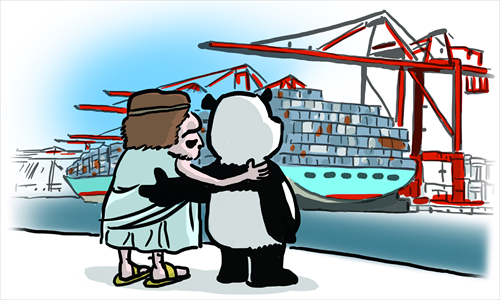Shipping, culture keys to Sino-Greek colossus

Illustration: Liu Rui/GT
The recent stopover of Chinese President Xi Jinping to the island of Rhodes set a notable diplomatic precedent. Within only a month, it was the second time that a top Chinese leader visited Greece.
Last month, Premier Li Keqiang visited Athens and Crete, captivating the Greek public not only by setting an ambitious cooperation agenda, but also by demonstrating deep knowledge and appreciation for the country's rich cultural heritage.
Xi's visit on Sunday was a milestone for the Sino-Greek strategic partnership. Taking place at the island which once housed one of the "seven wonders of the ancient world," the Colossus statue of the sun god Helios, Xi's visit to Rhodes set the cornerstone of a modern-day bilateral "colossus."
Xi reiterated the sincere and strategic interest of Beijing to invest in Greek ports, airports, infrastructure, railways and energy, to purchase more Greek-issued eurobonds, and to engage in cultural diplomacy with the cradle of European civilization.
The Greek ports are the entry points to the European common market, making Greece crucial part of the New Maritime Silk Road, especially as 50 percent of Chinese trade is transferred by Greek-owned merchant ships.
Moreover, Greek shipping companies have important know-how in maritime business and technology, and can contribute to China's own civilian and commercial maritime development.
China has already had positive experience in terms of its maritime cooperation with Greece. The State-owned maritime giant COSCO has one of its most profitable investments abroad in Greece's major port of Piraeus. The company is looking to expand its share, and has attracted other leading Chinese corporations like ZTE and Lenovo to build their Southeast European headquarters in the area as well.
But the case of Piraeus has also raised concerns within the EU, which is worried about the transparency of the venture. In addition, there are signals of growing intra-European competition following the Greek rapprochement with China. Similar concerns are raised regarding China's potential investment in Greek airports and railways.
Nonetheless, both Xi and his Greek counterpart Antonis Samaras reiterated that the Sino-Greek relationship is part of broader China-EU relations.
Samaras, in his official statement at the meeting with Xi, seemed determined to grab the window of opportunity of the New Maritime Silk Road and welcome the announced investments from China.
Xi reaffirmed that he is a true friend of Greece, labeling it as one of the most reliable and friendly partners of China in the EU. He also vowed to promote Greece as a destination for Chinese tourists. Paired with the promise of investing in Greek airports, the cooperation in tourism offers great possibilities for revamping one of the key sectors of the Greek economy.
It is important to emphasize that the relationship between a vast country like China and a medium-sized EU country like Greece can have important regional ramifications as well.
Chinese infrastructure and logistical investments can contribute to the economic renewal and integration of the Balkan Peninsula and help tame the forces of nationalism that have tormented the area.
China has already invested in infrastructure projects in several of the Balkan countries, and has shown interest in pursuing transnational projects as well. This makes an excellent opportunity for the governments in the region to mend fences, approach China together, and develop a regional economic strategy.
If played smart, the emerging Sino-Hellenic bilateral colossus can be a great step toward reversing the economic loss that the Balkans and the wider Mediterranean region have endured for decades.
Through its two visits, the Chinese leaders demonstrated their unswerving interest for cooperation. Now it is the turn of Greek and the Balkan leaders to help convert the promises into policy.
Vasilis Trigkas is a non-resident WSD-Handa fellow for the Pacific Forum CSIS and a global shaper for the World Economic Forum. Anastas Vangeli is a doctoral researcher at the Graduate School for Social Research and a Research Assistant at the Cross-National Research and Training Program at the Polish Academy of Science in Warsaw. They are graduates of Tsinghua University and Renmin University of China respectively. opinion@globaltimes.com.cn